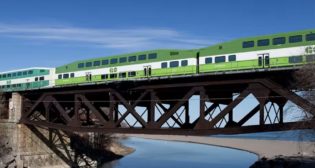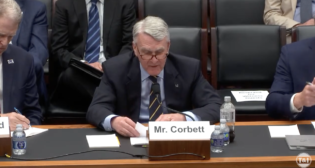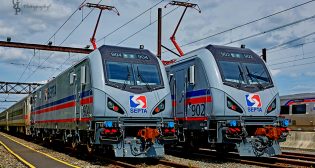
Caltrain Modernization funding increased; CHSRA adds $113 million
Written by William C. Vantuono, Editor-in-Chief
On May 5, 2016, the Caltrain Board of Directors adopted an agreement that invests an additional $211 million in the Caltrain Modernization Program. The seven-party agreement increases funding commitments from Caltrain’s state and local partners, including an additional $113 million commitment from the California High Speed Rail Authority (CHSRA).
The need for additional funding was identified in 2014 when the project’s budget was updated from 2008 cost estimates, and funding partners agreed to increase the amount budgeted for project contingency.
Caltrain plans to award contracts in July 2016 and introduce electrified service in 2020. In February, the Obama Administration allocated $72 million in prior-year funding to the project and asked Congress for an additional $125 million in the 2017 Federal Budget through the FTA Core Capacity Grant Program. These funds are part of a larger $647 million request for a Federal FFGA (Full Funding Grant Agreement) that is expected to be finalized in 2016. Contracts for the electrification project will be structured so that full authorization to proceed with construction is issued following the approval of Caltrain’s FFGA request.
The Caltrain Modernization Program will electrify the system between San Francisco and the Tamien Station in San Jose and replace Caltrain’s diesel-based system with high-performance EMUs (electric multiple units). CalTrain says the electrification project will reduce diesel emissions in this corridor by 96% by 2040, and will allow Caltrain to provide more service to more stations, increasing ridership and providing faster service between San Francisco and San Jose.
Approval of the agreement “helps prepare the Board to consider the award of contracts to equip the rail corridor with electrification infrastructure and replace most of the system’s diesel trains with high-performance electric [multiple-unit] vehicles.” Caltrain said. “These improvements will help address rapidly growing ridership by providing more service to more riders at more stations and will significantly decrease vehicle-miles travelled and greenhouse gas emissions along the Peninsula corridor. The project will also lay the foundation for improvements necessary to connect the Bay Area to the rest of the state with high-speed rail.”
“Caltrain’s partners and our regional, state and federal stakeholders have a long history of pulling together to help maintain this railroad and allow it to thrive,” said Adrienne Tissier, Metropolitan Transportation Commissioner and Joint Powers Board Director. “From its inception in 1992, when the Joint Powers Board first took over administration and operation of this 150-year old railroad, to the coalition that has formed to electrify Caltrain and bring it into the 21st century, this system is a great example of the good work that can be done when the region unifies towards a shared goal.”
“Caltrain electrification is extremely important to improving Bay Area transit connections and to our efforts to encourage more public transit use for people going to and from San Francisco.” said Ed Reiskin, Director of Transportation for the City and County of San Francisco. “The city continues to grow and our regional roadways are already nearing capacity. Electrifying Caltrain will make it an even better option for more people for more trips, and will pave the way for ultimately getting Caltrain and California High Speed Rail to the Transbay Transit Center. The city and the region will benefit significantly from this investment, which is necessary to better accommodate today’s riders, as well as future Bay Area residents, workers, and visitors.”
“The region is unified in support of the Electrification of Caltrain,” said Tilly Chang, Executive Director of the San Francisco County Transportation Authority. “This vital project provides congestion relief for San Francisco Peninsula corridor travelers, significantly reduces harmful emissions, and lays the foundation for bringing Blended Caltrain/High-Speed Rail service to San Francisco’s Transbay terminal by 2025.”
“Our region, along with our federal and state partners, has demonstrated a deep commitment to this project,” said Jim Hartnett, Caltrain’s Executive Director. “The Caltrain Modernization Program is the most transformative project this corridor has ever undertaken. It offers unique economic, environmental and mobility benefits to the region. It is a key link in a high speed rail network that will transform the way we think about transportation in California.”
“Caltrain plays a pivotal role in addressing Santa Clara County’s congestion reduction efforts and in bringing in commuters who will then connect with VTA’s bus and light rail system for the last leg of their trip,” said Perry Woodward, Santa Clara VTA board member. “A modern, electrified Caltrain system will increase service to South Bay residents and commuters and reduce traffic on our congested roads. VTA strongly supports electrification for the long term growth of the Caltrain system.”



